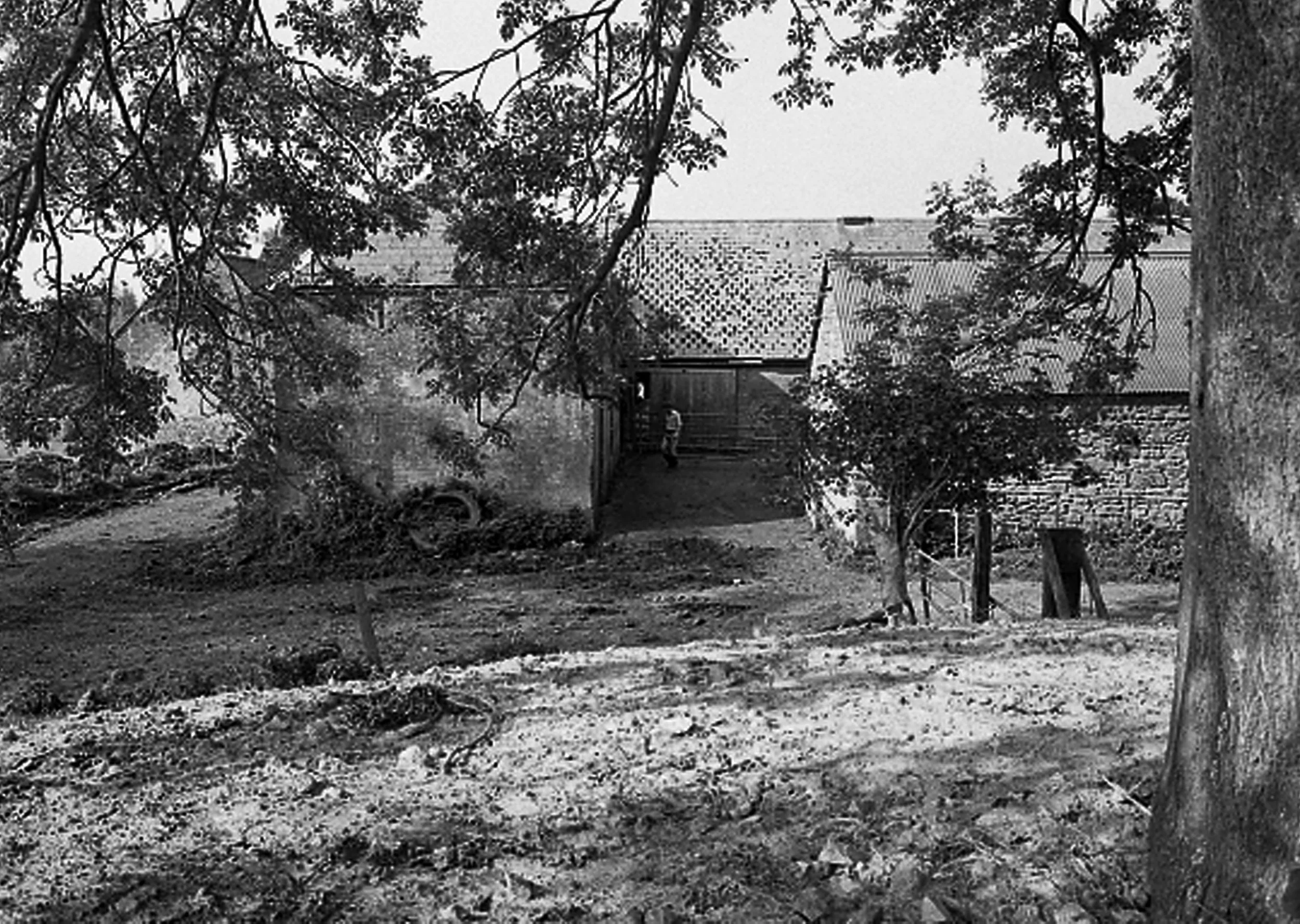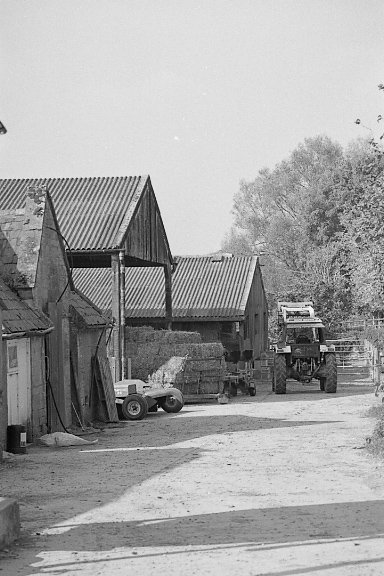Freddie Bailey: a Chiselborough gentleman
An interview by Deb Lewis
In connection with my interest in the history and development of Manor Barton, I was so privileged to be asked to meet with Freddie Bailey in his home one early evening in October 2022 along with Tony and June Perry. I spent a truly enjoyable and fascinating two hours chatting with him and listening to his charismatic telling of the tales of his life as a boy in Chiselborough, his work on Manor Farm and other buildings and traditions in Chiselborough.
Freddie was one of the best raconteurs I have had the pleasure to meet. His memories were so vivid and his accounts always tinged with humour. My sadness is that we never managed the follow up meeting when we planned to do part two along with some tea and cake.
In Freddie’s memory, we have had permission from his family to go ahead and publish for the village website a series of snippets of the interview. I have tried to keep the interview as true to Freddie’s own words as is possible.
This interview forms part one and I have focused on his early life and some of his fond and captivating memories of working at Manor Farm. Explanations in italics.
Freddie and Chiselborough – Part 1
Q: Have you always lived in Townsend Villas, Freddie?
‘I was born in a house in Fairplace, Chiselborough and I went (to Manor Farm) to watch the horses from a young age…mother was worried sick!
I had three sisters, Hazel, Daisy and Beryl, and, in 1939, we moved here (to Townsend Villas) in a horse and waggon … I have been here ever since. There were oil lamps then…in my time, we did have mains water but the water pump was there still. ’
‘This was a happy house…(Freddie pointing to an area of the house where he keeps his vast collection of pottery shire horses) over there was a piano for when father came from work… Hazel could play any tune as Violet Hockey taught Hazel…Daisy and Beryl had posh lessons and mother paid a lot for them…Beryl was learning the violin – or making a noise! Hazel and dad played as they used to have dances in the village hut down here…’
Q: Where was the village hut?
‘ It was an ex-army hut…near the little well…where Cecil Gillman used to live (where Roundwell House is, opposite Violets and Little Eleven)…They used to have dances there and during the war Americans used to come to Chiselborough and jitterbug…and the whole hut used to go like that (Freddie gesturing up and down)…we boys crawled under the floor waiting for the money that fell out of pockets!’
Historic view over the old village hut (on left) towards Church
Q: What can you tell me about Manor Farm back then?
‘I can draw that farm in my head…every building that was there…’
Freddie proceeded to talk his way around the twelve current properties at Manor Barton, starting at number 12 and moving clockwise around the current courtyard. I have put the numbers of the properties where it was clear which buildings they were.
‘Going down through Barton, there was the pigsties there (number 12)…then there was the cowstall for about 15 cows…opposite side there was the big stall which held 50 cows or perhaps more…and behind that was the calf pens (probably numbers 9-11).’
‘Then there was the mill (number 8) and, when I was a lad, the water wheel was still there. During the war, they cut it up and took all the metal and took all the rails off Chiselborough school and everywhere.’
‘As you come on down, there was a place where they sheared the sheep and there was a granary…quite a large granary…there was trap door for the granary and they used to back the truck under the waggon to that (number 8).’
Next door was the main barn (number 7 and 6?)…with doors higher than my sitting room…then there was an arch (between numbers 6 and 5) and then stables for 12 horses – with 6 heavy horses on the left and a tack room then a loose box; then another 6 stalls for heavy horses (numbers 5 and 4?) Then there was a little place for the store of bottled drink (possibly cider?) and then the cellar. They never made cider in my time but in Mr Clark’s time they bottled it there. ‘
‘Over there was a loft where we used to chit all of the potatoes (possibly number 4)…then turn right and there was a stone toilet…I have never seen a toilet on a farm! That was built in 1800 and something’. (close to numbers 4 and 3)
Next was a little dairy where they used to cook the milk; next on was a coach house where you could house a coach and where Mr Holloway used to keep his car; next on two hackney stables for two hunters and a loose box; and then the tack room for that. Then the pens backing onto the wall…I am drawing this in my head…’ (this seems like numbers 1-3)
Q: How do you recall all of this detail?
‘How I know so much about the farm is that I ‘lived’ there as a boy…I used to go down there and ask if I could ride the horses; they put two horses and cart together to go over that hill, one as a front horse and I used to sit on that.’
Q: As a boy - how old were you?
‘About 10 …my dad wanted me to go to Westlands to work but I was crazy after horses…If I could have been a jockey I would…I was only 8 stone when I came out of the army…but when I was old enough to work on the farm, I did three years driving horses from age 15 to 18...then that was the end of the horse era really.’
Q: When you say ‘driving horses’ what did that mean?
‘I drove a team of two…we had four horses then and some cobs…I used to do horse hoeing, single row, up and down, every day, for three months and I never had a watch! Getting the ground ready for beet and animal fodder. I used to listen to the Norton bell on Norton church and the hooter for the factory (glove factory in Stoke)…one day, I was on Chiselborough Hill when I heard the wrong hooter…mother said “what are you doing home now?”; “it is dinner time”, I said; mother replied “it is only 12 o’clock!”. I went back and I don’t know if the boss knew! But I could always tell when Mr Holloway was coming as he used to ride a hunter called Twilight…and my horse always raised his ears as he could hear him two or three fields away!’
‘Down that farm you never seen so much mud in your life! Oh…I missed out something…you know the big barn – there were two houses for tumbrels and five waggons too. Later they moved on to farm pigs, as Mr Holloway was big into the pigs…and there were pigs on Chiselborough Hill. When there are potatoes, there are always some left behind – for the pig feed.’
‘During the war, there were about 20 farm workers, including ladies – and a Ms Athlan who rode a motorbike with a little dog on it! June’s mum was there then…the land army during the war.’
‘As a boy, they were still hand milking all the cows…there was Mr Bennett…in the Dairy House and he had three sons who all used to milk the cows…Norman and Eric as boys, one miking before he went to school and his brother became a shepherd…lasted a few days at Westlands and then came back! There were three chaps from West Chinnock who worked on the farm too - they used to cycle home to lunch in their 20 minute break! I wouldn’t be doing that! Then there was Arthur Vaughan who used to lay the hedges like June’s dad did.’
‘Next to the Dairy House, there was barn which was where we used to play football. Before my time, there was stuff for making butter there – all abandoned. Then along from there was the farm office – in my time, it was where the home guard used to hang out. Next to that a place to store the rabbits – there were so many rabbits in Chiselborough. They used to place wires in the corn to control the rabbits… there were rabbit catchers for six months of the year – Mr Shire and Mr Raison.’
Q: There was a lot of physical work then, Freddie?
‘When I was a lad, they were using horses to bail the hay – no bailer machine then. When I started, I used to turn the hay with horse turners to put it into rolls. Everything was physical then.’
‘There was piece work for planting crops – if you could do it fast, you could earn good money. I was glad to be driving a horse… I walked near 20 miles a day…up and down. I’d get the ground ready…including at Funcombe…down over there and ploughing it. Also, we kept pigs on the right side of Funcombe. Flies! You never seen anything like it! I was the last to get a ride on the horses called Pleasant, Violet and Prince, a team driven by June’s uncle.’
Compiled by Deb Lewis
Filmed by Tony Perry
Photograph of Freddie by Tony Perry
Information assisted by June Perry
December 2022



